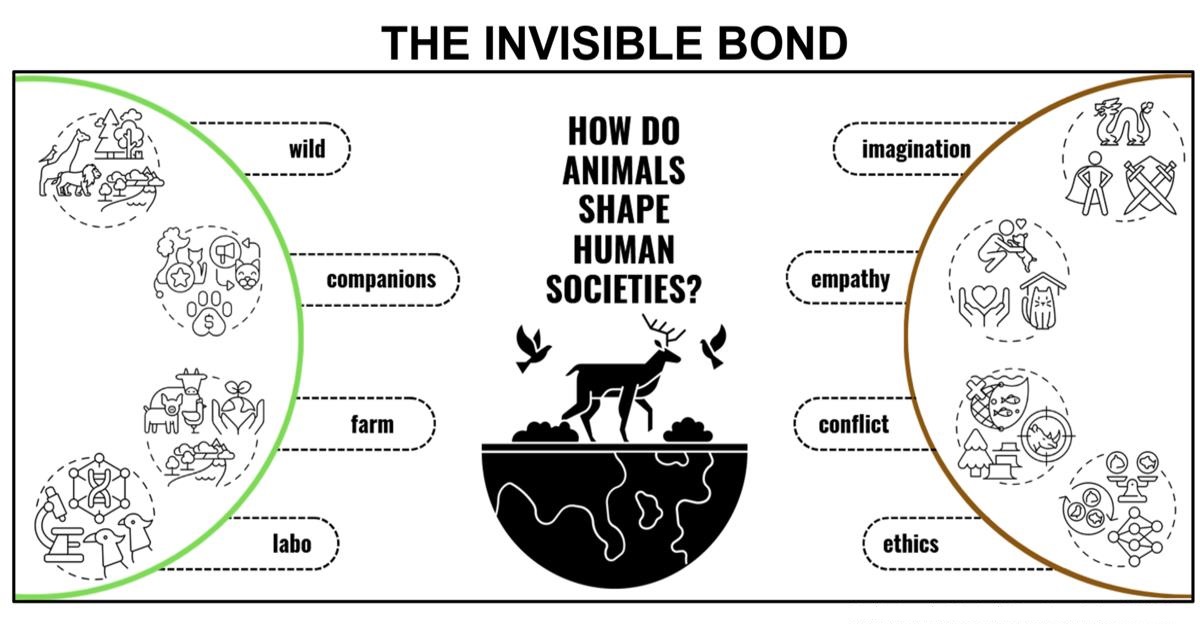The Invisible Bond: How Animals Shape Human Society
A special issue of Animals (ISSN 2076-2615). This special issue belongs to the section "Human-Animal Interactions, Animal Behaviour and Emotion".
Deadline for manuscript submissions: 1 June 2026 | Viewed by 1947

Special Issue Editor
Interests: dog-human relationship; canine behavior; canine representations in literatures; zoofeminism; animal studies; zoopoetics
Special Issues, Collections and Topics in MDPI journals
Special Issue Information
Dear Colleagues,
As the 21st century is challenging anthropocentrism, human relationships with nature, our planet, and its inhabitants are changing. In a time of growing concern about non-human beings and environmental causes, contemporary sciences as a whole are experiencing an “animal turn” (Cederholm et al., 2014). Driven by recent scientific discoveries, particularly in biology and ethology, we have observed a modification in the status of non-human animals in our societies. Once considered emotionless machines (Descartes, Harrison 1992), they are now appreciated for their individualities, personalities, and sensitivities.
However, the relationships established with them are various and complex. From companion animals—with whom our relationships are so strong that they are now considered full family members—to non-domesticated species who are either feared or admired, in addition to working animals and livestock who are used to serve humans purposes, how and to what extent do our relationships with animals create specific dynamics in our societies?
Since the pioneering work Animal Liberation by Peter Singer (1975), as well as the emergence of the animal studies and animal ethics research fields in the 2000s, anti-speciesism and sentience are reconfiguring our way of considering non-human animals. Recent publications, such as The Rise of Critical Animal Studies, emphasize the interdisciplinary dimension when studying the bonds between human and non-human animals, as well as their links with the study of other social issues.
Thus, the present Special Issue aims to publish research work from different scientific fields, utilizing a transdisciplinary perspective in order to explore the multiple aspects in which our bonds with other animals shape our societies. Original manuscripts that address any aspects of these interactions are invited to be submitted to this Special Issue. The studied societies can be real or fictional, various cultures from our past, present, or future, and can be investigated from the group to the dyadic level, for any species, in any setup. Attitudes to animal relationships or status amongst the public, as well as direct field observations, are also welcome, as long as the research discusses the way these attitudes influence the studied society.
Due to the explicit willingness to publish an interdisciplinary Special Issue, the areas of special interest include behavioral science, social sciences, anthropology, sociology, philosophy, animal studies, cultural studies, literature, zoofeminism, and zoopoetics.
Bibliography
1. Cederholm, E. A., Björck, A., Jennbert, K., & Lönngren, A. S. (2014). Exploring the animal turn: Human–animal relations in science, society and culture. The Pufendorf Institute of Advanced Studies, Lund University.
2. Harrison, P. (1992). “Descartes on animals”. The Philosophical Quarterly (1950-), 42(167), 219-227.
3. Singer P. (1975), Animal Liberation: A New Ethics for Our Treatment of Animals, Harper Collins, New York.
4. Taylor Nik & Twine Richard (ed.) (2014) The Rise of Critical Animal Studies – From the Margins to the Center, Routledge, London.
Dr. Charlotte Duranton
Guest Editor
Manuscript Submission Information
Manuscripts should be submitted online at www.mdpi.com by registering and logging in to this website. Once you are registered, click here to go to the submission form. Manuscripts can be submitted until the deadline. All submissions that pass pre-check are peer-reviewed. Accepted papers will be published continuously in the journal (as soon as accepted) and will be listed together on the special issue website. Research articles, review articles as well as short communications are invited. For planned papers, a title and short abstract (about 250 words) can be sent to the Editorial Office for assessment.
Submitted manuscripts should not have been published previously, nor be under consideration for publication elsewhere (except conference proceedings papers). All manuscripts are thoroughly refereed through a single-blind peer-review process. A guide for authors and other relevant information for submission of manuscripts is available on the Instructions for Authors page. Animals is an international peer-reviewed open access semimonthly journal published by MDPI.
Please visit the Instructions for Authors page before submitting a manuscript. The Article Processing Charge (APC) for publication in this open access journal is 2400 CHF (Swiss Francs). Submitted papers should be well formatted and use good English. Authors may use MDPI's English editing service prior to publication or during author revisions.
Keywords
- human–animal relationships
- animal behavior
- animal studies
- zoopoetics
- zoofeminism
- zoosociology
- zooanthropology
Benefits of Publishing in a Special Issue
- Ease of navigation: Grouping papers by topic helps scholars navigate broad scope journals more efficiently.
- Greater discoverability: Special Issues support the reach and impact of scientific research. Articles in Special Issues are more discoverable and cited more frequently.
- Expansion of research network: Special Issues facilitate connections among authors, fostering scientific collaborations.
- External promotion: Articles in Special Issues are often promoted through the journal's social media, increasing their visibility.
- Reprint: MDPI Books provides the opportunity to republish successful Special Issues in book format, both online and in print.
Further information on MDPI's Special Issue policies can be found here.






